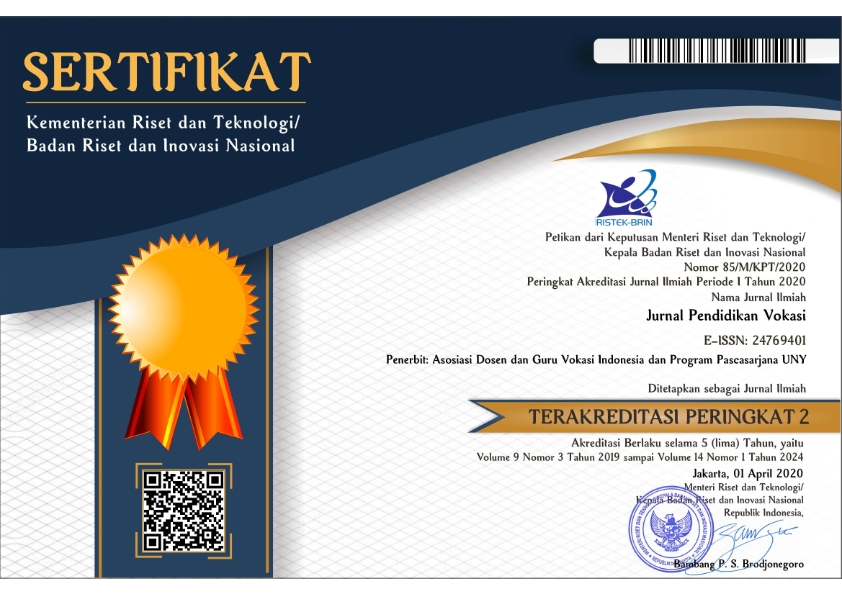Analysis of the indirect correlation between academic achievement, intrinsic and extrinsic motivation, and self-efficacy on teaching readiness
Pardjono Pardjono, Universitas Negeri Yogyakarta, Indonesia
Galeh Nur Indriatno Putra Pratama, Dresden University of Technology, Germany
Abstract
Keywords
Full Text:
PDFReferences
Adnyani, I. G. A. D., & Suwandana, I. G. M. (2022). The role of self efficacy moderating the influence of individual competence and knowledge sharing on the performance of MSMEs in Gianyar Regency. International Journal of Economics, Business and Management Research, 6(6), 125–137. https://doi.org/10.51505/IJEBMR.2022.6610
Agusriati, I., Taher, A., & Abdi, A. W. (2021). Hubungan 21st century skills dan self efficacy dengan kesiapan menjadi guru mahasiswa jurusan Pendidikan Geografi FKIP Universitas Syiah Kuala. Jurnal Pendidikan Geosfer, 6(2), 115–123. https://doi.org/10.24815/jpg.v6i2.22544
Alkhalifah, Z. (2022). The impact of self-efficacy, learning preferential, learning motivation and academic achievement on EFL students in Saudi Arabia. World Journal of English Language, 13(1), 225. https://doi.org/10.5430/wjel.v13n1p225
Alwisol, A. (2019). Psikologi kepribadian. Universitas Muhammadiyah Malang.
Awogbemi, C. A., Alagbe, S. A., & Oloda, F. S. S. (2022). On the path analysis techniques and decomposition of correlation coefficients. Asian Journal of Probability and Statistics, 20(4), 208–219. https://doi.org/10.9734/ajpas/2022/v20i4450
Baiti, R. D., Abdullah, S. M., & Rochwidowati, N. S. (2017). Career self-efficacy dan kesiapan kerja pada mahasiswa semester akhir. Jurnal Psikologi Integratif, 5(2), 128–141. https://core.ac.uk/download/pdf/229437714.pdf
Bantam, D. J., Mifti Jayanti, A., & Erwan Syah, M. (2022). Efektivitas goal setting untuk peningkatan career efficacy pada remaja di bawah asuhan Dinas Sosial Pemberdayaan Perempuan dan Perlindungan Anak Kulon Progo. Journal of Innovation in Community Empowerment, 4(1), 14–22. https://doi.org/10.30989/jice.v4i1.713
Barron, K. mname, & Gravert, C. mname. (2018). Confidence and career choices: An experiment. SSRN Electronic Journal, 124(1), 35–68. https://doi.org/10.2139/ssrn.3099491
Dalyono, M. (2005). Psikologi pendidikan. Rineka Cipta.
Djamarah, S. B. (2011). Psikologi belajar. Rineka Cipta.
Dugard, P., Todman, J., & Staines, H. (2022). Path analysis. In Approaching Multivariate Analysis (pp. 159–176). Routledge. https://doi.org/10.4324/9781003343097-7
Evioni, E., Ahmad, B., & Harmalis, H. (2022). Hubungan antara self concept dan self efficacy terhadap kesiapan kerja siswa kelas XII di SMK Negeri 5 Kerinci. Indonesian Journal of Counseling and Development, 4(1), 31–43. https://doi.org/10.32939/ijcd.v4i1.1277
Fahmi, I. (2016). Manajemen sumber daya manusia, teori dan aplikasi. Alfabeta.
Fataron, Z. A., & Sijabat, R. (2019). The pathway of strengthening the working readiness: A study on graduate students of Islamic Economics and Business Faculty of UIN Walisongo Semarang. Jurnal Pendidikan Vokasi, 9(3), 258–269. https://doi.org/10.21831/jpv.v9i3.26948
Fauzan, A., Triyono, M. B., Hardiyanta, R. A. P., Daryono, R. W., & Arifah, S. (2023). The effect of internship and work motivation on students’ work readiness in vocational education: PLS-SEM approach. Journal of Innovation in Educational and Cultural Research, 4(1), 26–34. https://doi.org/10.46843/jiecr.v4i1.413
Garcia-Bolaños, J. R., Balajediong Jr., G., Tarongoy, G. L., Mayola, S. J., Kamaong, A. A., Cajutol, R. M., Pantino, A. D., Biao, D. R. G., & Reyes, E. R. (2022). Transitioning from online to blended learning modality: A study on students’ physical and mental readiness. European Journal of Education Studies, 9(7). https://doi.org/10.46827/ejes.v9i7.4376
Ghozali, I. (2016). Desain penelitian kuantitatif dan kualitatif: Untuk akuntansi, bisnis, dan ilmu sosial lainnya. Yoga Pratama.
Helmawati, H. (2018). Mendidik anak berprestasi : Melalui 10 kecerdasan (A. S. Wardan (ed.)). Remaja Rosdakarya.
Itryah, I., & Anggraini, B. F. (2022). Hubungan self efficacy terhadap kesiapan kerja pada siswa kelas XI SMK Pembina 1 Palembang. JIIP - Jurnal Ilmiah Ilmu Pendidikan, 5(10), 3918–3962. https://doi.org/10.54371/jiip.v5i10.962
Karo, N. K. S. B., Sihombing, M., & Ginting, S. (2021). Hubungan motivasi kerja pegawai dengan produktivitas kerja pegawai Kantor Camat Tigabinanga Kabupaten Karo. Jurnal Darma Agung, 29(2), 258. https://doi.org/10.46930/ojsuda.v29i2.1070
Kim, C. (2022). Effects of flipped classroom on EFL college students’ intrinsic motivation, extrinsic motivation and self-efficacy. The British and American Language and Literature Association of Korea, 147, 123–152. https://doi.org/10.21297/ballak.2022.147.123
Kurniawan, A. W., Musa, M. I., Dipoatmodjo, T. S., & Nurman, N. (2020). Determinants of university student’s work readiness. International Journal of Recent Technology and Engineering (IJRTE), 9(1), 323–331. https://doi.org/10.35940/ijrte.A1445.059120
Latif, A., Yusuf, A. M., & Efendi, Z. M. (2017). Hubungan perencanaan karier dan efikasi diri dengan kesipan kerja mahasiswa. Konselor, 6(1), 29–38. https://doi.org/10.24036/02017616535-0-00
Makki, B. I., Feng, F., Waqar, M. A., & Adhikari, I. M. (2023). Work readiness, decision-making self-efficacy, and career exploration among engineering students: A two-step framework. Mathematical Problems in Engineering, 2023, 1–8. https://doi.org/10.1155/2023/8166825
Makki, B. I., Salleh, R., Memon, M. A., & Harun, H. (2015). The relationship between work readiness skills, career self-efficacy and career exploration among engineering graduates: A proposed framework. Research Journal of Applied Sciences, Engineering and Technology, 10(9), 1007–1011. https://doi.org/10.19026/rjaset.10.1867
Partono, P., Aji, Y., & Irdianto, W. (2020). The influence of character building, learning environment and self efficacy on students’ work readiness. Journal Teknologi, Kejuruan Dan Pengajaran, 43(1), 67–74. https://core.ac.uk/download/pdf/354312099.pdf
Ponurenko, S. Н., Kolomatska, V. P., & Chernobay, L. M. (2022). Path analysis of the relationships between the performance and its constituents in corn lines. The Scientific Journal Grain Crops, 5(2), 226–232. https://doi.org/10.31867/2523-4544/0180
Pramesti, A. D., Hermahayu, H., & Faizah, R. (2022). Study of identifying factors for the developing measuring instrument on the psychological readiness of athletic athletes. Jurnal SPORTIF : Jurnal Penelitian Pembelajaran, 8(3), 17–36. https://doi.org/10.29407/js_unpgri.v8i3.18807
Reyes-Wapano, M. R. (2022). A path analysis of the relationships among parenting styles, emotional intelligence and resilience. International Journal of Research and Innovation in Social Science, 6(8), 07–13. https://doi.org/10.47772/IJRISS.2022.6801
Ristiani, R., & Lusianingrum, F. P. W. (2022). The effect of self confidence on job readiness. Journal of Applied Business, Taxation and Economics Research, 1(5), 450–461. https://doi.org/10.54408/jabter.v1i5.89
Riyanto, J., Kuat, T., & Tentama, F. (2020). The influence of work competence, learning motivation, independence and discipline on work readiness of vocational school students in Cilacap Regency. Asian Journal of Vocational Education and Humanities, 1(2), 25–36. https://doi.org/10.53797/ajvah.v1i2.3.2020
Robbins, S. P., & Judge, T. A. (2009). Organizational behavior. Pearson.
Sardiman, A. M. (2018). Interaksi & motivasi belajar-mengajar. Rajawalil Pers.
Tentama, F., & Abdillah, M. H. (2019). Student employability examined from academic achievement and self-concept. International Journal of Evaluation and Research in Education (IJERE), 8(2), 243. https://doi.org/10.11591/ijere.v8i2.18128
Tentama, F., Merdiaty, N., & Subardjo, S. (2019). Self-efficacy and work readiness among vocational high school students. Journal of Education and Learning (EduLearn), 13(2), 277–281. https://doi.org/10.11591/edulearn.v13i2.12677
Uno, H. B. (2007). Teori motivasi & pengukurannya. Bumi Aksara.
Usher, E. L., & Morris, D. B. (2023). Self-efficacy. In Encyclopedia of Mental Health (pp. 117–124). Elsevier. https://doi.org/10.1016/B978-0-323-91497-0.00085-0
Vecenane, H., & Vazne, Ž. (2022). Intervention of autogenous training techniques for psychological preparedness of sports school students. Education. Innovation. Diversity, 1(4), 57–63. https://doi.org/10.17770/eid2022.1.6806
Vieira, L. F., Silva, J. W. da, Nascimento, M. R., Santos, P. R. dos, & Baroni, D. F. (2022). Path analysis in the evaluation of ethanol and culm yield components in sweet sorghum. Pesquisa Agropecuária Tropical, 52, e72850. https://doi.org/10.1590/1983-40632022v5272850
Warmansyah, J., Amalina, A., & Febriyani, E. (2022). Analisis korelasi self-efficacy guru paud dalam penggunaan teknologi dengan kesiapan mengajar secara online. MAp (Mathematics and Applications) Journal, 4(1), 9–17. https://doi.org/10.15548/map.v4i1.4143
Wiharja, H. M., Rahayu, S., & Rahmiyati, E. (2020). Pengaruh self efficacy terhadap kesiapan kerja mahasiswa pendidikan vokasi. VOCATECH: Vocational Education and Technology Journal, 2(1), 11–18. https://doi.org/10.38038/vocatech.v2i1.40
Wijikapindho, R. A., & Hadi, C. (2021). Hubungan antara self-efficacy dengan kesiapan kerja pada mahasiswa semester akhir. Buletin Riset Psikologi Dan Kesehatan Mental (BRPKM), 1(2), 1313–1318. https://doi.org/10.20473/brpkm.v1i2.28820
DOI: https://doi.org/10.21831/jpv.v14i1.59766
Refbacks
- There are currently no refbacks.

This work is licensed under a Creative Commons Attribution-ShareAlike 4.0 International License.
Our journal indexed by:
















